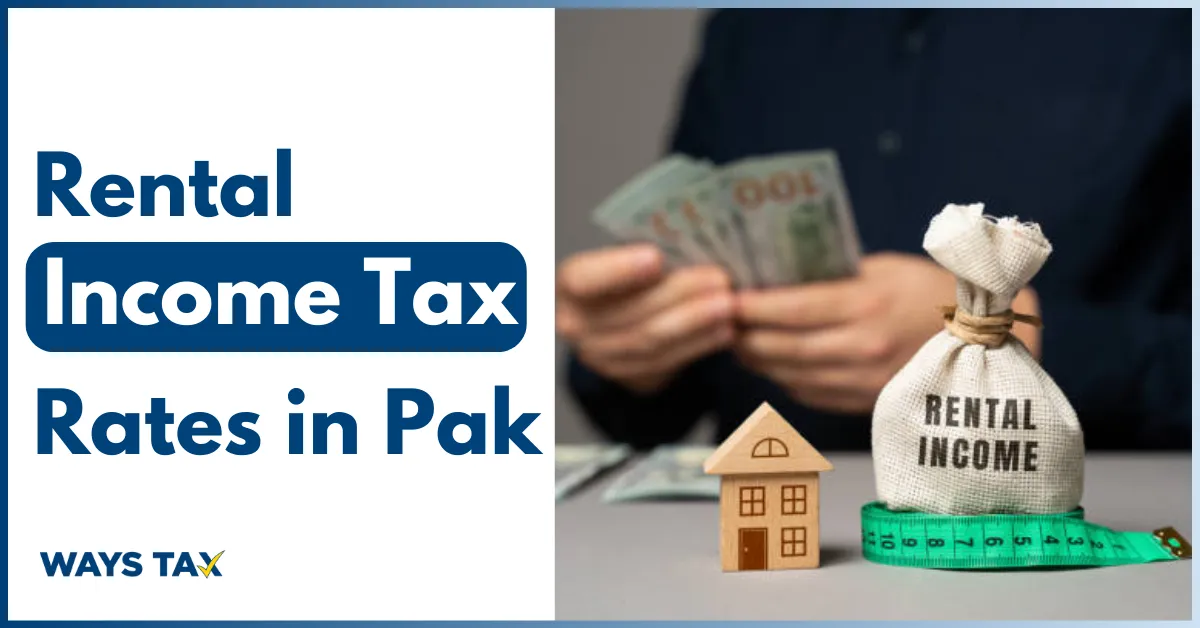Latest Rental Income Tax Rates in Pakistan in 2025
Whether you’re renting out a single property or managing a portfolio of rentals, understanding how rental income is taxed in Pakistan is crucial. With evolving regulations and stricter enforcement by the Federal Board of Revenue (FBR), staying compliant is no longer optional; it’s essential for avoiding penalties and making smart financial decisions.
This guide is designed to give property owners, investors, and professionals a clear, updated overview of rental income tax rates in Pakistan in 2025.
From applicable tax rates and allowable deductions to filing requirements and strategic tips, we break everything down in simple terms so you can make informed, confident decisions.
Confused about your rental income tax?
Let Waystax.com simplify it for you. Calculate, file, and stay compliant—hassle-free!

Different Types of Rental Income Taxes in Pakistan
Rental income in Pakistan is subject to the following main types of taxes:
1. Final Rental Income Tax in Pakistan
Final tax is applied to net rental income after deducting allowable expenses. It is payable when landlords file their annual tax returns.
The tax slabs for individuals for the tax year 2024–25 are
| Annual Rental Income (PKR) | Tax Payable |
| Up to 600,000 | Exempt |
| 600,001 – 1,200,000 | 90,000 + 20% on the amount above 1.2M |
| 1,200,001 – 1,600,000 | 170,000 + 30% on the amount above 1.6M |
| 1,600,001 – 3,200,000 | 650,000 + 40% on the amount above 3.2M |
| 3,200,001 – 5,600,000 | 1,610,000 + 45% on the amount above 5.6M |
| Above 5,600,000 | 1,610,000 + 45% on amount above 5.6M |
These rates apply to individuals under the Income Tax Ordinance, 2001.
Use the Rental income rates in Pakistan calculator for quick and accurate tax estimates.
2. Withholding Tax (WHT) on Rental Income
Withholding tax on rental income in Pakistan is deducted by the tenant at the source and must be deposited with the FBR by the 15th of the following month.
It applies to both individuals and companies, with different rates for filers and non-filers in tax year 2024–25:
| Annual Rent (PKR) | Filer’s Rate | Non-Filer’s Rate |
| Up to 300,000 | Exempt | Exempt |
| 300,001 – 600,000 | 15,000 + 10% on the amount above 600,000 | 10% on amount above 300,000 |
| 600,001 – 2,000,000 | 155,000 + 25% on the amount above 2M | 10% on the amount above 300,000 |
| Above 2,000,000 | 310,000 + 50% on the amount above 2M | 30,000 + 20% on the amount above 600,000 |
Deductions are not applicable when calculating WHT.
For accurate results, use the Rental income tax calculator, Pakistan
Rental Income Tax Rates in Pakistan for Different Prospects
The income tax rate in Pakistan is charged on a progressive slab system for individuals, while corporate entities are taxed at a flat rate.
Below is a breakdown of the applicable tax rates:
For Individual Landlords
| Annual Rent (PKR) | Tax Rate |
| Up to 300,000 | Tax-Free |
| 300,001 – 600,000 | 5% on the amount exceeding PKR 300,000 |
| 600,001 – 2,000,000 | PKR 15,000 + 10% on the amount exceeding PKR 600,000 |
| Above 2,000,000 | PKR 155,000 + 25% on the amount exceeding PKR 2,000,000 |
This is the withholding tax rate in Pakistan that tenants must deduct at the source (if applicable) and deposit to the FBR under Section 155.
For Companies/Corporate Landlords
- A flat 15% tax is applied on gross rental income, regardless of the amount earned.
What is Rental Income?

The money a property owner makes from renting out their home, apartment, business, or shop to a tenant is known as rental income. It covers all fees associated with using the property, including late fees, advance rent, and regular rent payments.
According to the Income Tax Ordinance, rental income in Pakistan is taxable and needs to be reported on the yearly tax return.
Overview of Rental Income Tax Rates in Pakistan
In Pakistan, rental income is taxed under a separate head of income as per Section 15 of the Income Tax Ordinance, 2001. This applies to individuals, businesses, and non-residents who earn income from letting out residential, commercial, or industrial properties.
The Federal Board of Revenue (FBR) monitors rental income through both self-declaration and withholding tax mechanisms. Whether you’re an individual landlord or a corporate entity, rental income is subject to tax after certain allowable deductions and is taxed at progressive rates depending on the amount earned.
Even overseas Pakistanis renting out property locally must declare and pay taxes in Pakistan. Compliance ensures avoidance of penalties and access to benefits like ATL (Active Taxpayer List) status.
Allowable Deductions on Rental Income
One of the most effective ways for landlords to reduce their taxable rental income in Pakistan is by claiming legitimate deductions.
These deductions directly lower the tax liability by subtracting qualifying expenses from the gross rental income.
Here are the key allowable deductions under Pakistan tax law:
1. Building Repairs and Maintenance
Up to 20% of the annual rent can be claimed for essential repairs and upkeep.
2. Insurance Premiums
Premiums paid for property insurance are fully deductible.
3. Local Taxes and Charges
Property tax, municipal rates, and other local levies can be deducted from rental income.
4. Ground Rent
If the property is built on leased land, the annual ground rent is an eligible deduction.
5. Loan Interest
Interest on loans taken to purchase, construct, or improve the rental property is deductible.
6. Management Expenses
Up to 4% of annual rent can be claimed for professional services related to rent collection, property management, or legal advice.
These deductions are vital for landlords to optimize tax planning and minimize tax outflows, making property rental a more attractive investment option.
Importance of Active Taxpayer Status (ATL)
In Pakistan, being listed on the FBR’s Active Taxpayer List (ATL) is not just a formality; it significantly reduces your tax burden and opens doors to financial advantages.
Why it Matters
- Lower Withholding Tax: Landlords in the ATL enjoy reduced WHT rates on rental income, bank transactions, dividends, and more.
- Access to Tax Refunds: Only active taxpayers can claim legitimate tax refunds from FBR.
- Business Credibility: Being on the ATL boosts your reputation in the eyes of banks, tenants, and corporate entities.
- Avoid Higher Tax Rates: Inactive taxpayers face double withholding taxes on most income sources, including rent.
How to Stay Active
- File your tax return before the annual deadline (usually Sept 30).
- Pay the ATL surcharge if you miss the deadline.
- Check your status regularly on the FBR ATL Portal.
Step-by-Step Process for Filing a Tax Return with Rental Income in Pakistan
Follow these steps to stay compliant in Pakistan
Step 1: Calculate Gross Rental Income
Include:
- Monthly Rent received
- Advance Rent payments
- Late Fees and other charges (if non-refundable)
Step 2: Deduct Allowable Expenses
Reduce your taxable income by claiming:
- Repairs & maintenance (up to 20% of rent)
- Property taxes
- Insurance premiums
- Ground rent
- Loan interest
- Management expenses (up to 4% of rent)
Step 3: File Your Tax Return
Option A: Online
- Visit FBR IRIS Portal
- Log in or register
- Fill in the rental income section accurately
Option B: Manual
- Download forms from the FBR website
- Fill and submit at your regional tax office
Step 4: Attach Supporting Documents
Submit clear proof such as:
- Receipts for repairs or management fees
- Bank deposit slips for rent
- Insurance payment receipts
Step 5: Pay Any Due Tax
Use applicable rental tax slabs to calculate and pay:
- Income ≤ PKR 300,000: Tax-Free
- PKR 300,001–600,000: 5% on the amount above PKR 300,000
- PKR 600,001–2,000,000: 15,000 + 10% on excess
- Above PKR 2,000,000: 155,000 + 25% on excess
Additional Tips
- Keep records for at least 6 years
- Avoid penalties by declaring all income
- Consult a tax expert to optimize deductions
Waystax ensures you remain on the ATL throughout the year.
Required Documents for Rental Income Tax Deductions
- Repair Receipts: For property maintenance (up to 20% of rent).
- Property Tax Receipts: Proof of paid local taxes.
- Insurance Premiums: Receipts for property-related insurance.
- Ground Rent Receipts: If land is leased.
- Loan Interest Statements: For property-related loans.
- Management Fee Invoices: Up to 4% of rent can be claimed.
- Legal Fee Receipts: For tenant or property disputes.
- Utility Bills: If utilities are claimed.
- Proof of Unpaid Rent: Notices or communication records.
- Bank Statements: Showing rental income deposits.
- Rental Agreements: With tenants and service providers.
Common Mistakes Landlords Make When Claiming Rental Tax Deductions

- Missing Documentation: Not keeping receipts or proof for claimed expenses.
- Overstating Deductions: Claiming more than the allowed limits (e.g., repair costs beyond 20%).
- Claiming Personal Expenses: Including non-rental or personal costs as deductions.
- Incorrect Loan Interest Claims: Claiming principal instead of just interest.
- Forgetting Management Fee Cap: Exceeding the 4% limit on management expense claims.
- Ignoring Active Taxpayer Requirement: Facing higher taxes for not being on the ATL.
- Not Updating Rental Agreements: Outdated contracts weaken claims and records.
- Claiming Irrecoverable Rent Without Evidence: No proof of collection efforts.
Waystax minimizes these risks with expert review and support.
Why Choose Waystax for Your Rental Income Tax Needs?
Our specialty at Waystax is making tax issues easier for Pakistani landlords and property owners. Our skilled tax consultants assist you whether you are an individual with a single rental property or oversee a sizable rental portfolio.
- Accurately calculate your rental income tax using the latest FBR income tax slabs
- Claim all legitimate deductions to reduce your tax burden
- Ensure timely tax filing through the FBR IRIS system
- Stay on the Active Taxpayer List (ATL) and avoid higher tax rates
- Avoid common pitfalls like misreporting or missing documents
- Receive full support in audits, assessments, or FBR correspondence
File Your Rental Income Tax now!
With Waystax, your compliance is guaranteed and your financial interests are protected.

FAQs
Final Thoughts | Rental Income Tax Rates in Pakistan
Landlords must comprehend the rental income tax rates in Pakistan in order to minimize fines and maximize tax advantages. You can lower your tax liability and maintain compliance by being aware of the relevant tax rates, permitted deductions, and filing requirements.
Waystax simplifies the process, ensuring you file on time, claim all legitimate deductions, and stay on the Active Taxpayer List (ATL). Let us help you navigate rental income taxation or income tax return filing so you can focus on your property investments with peace of mind.

